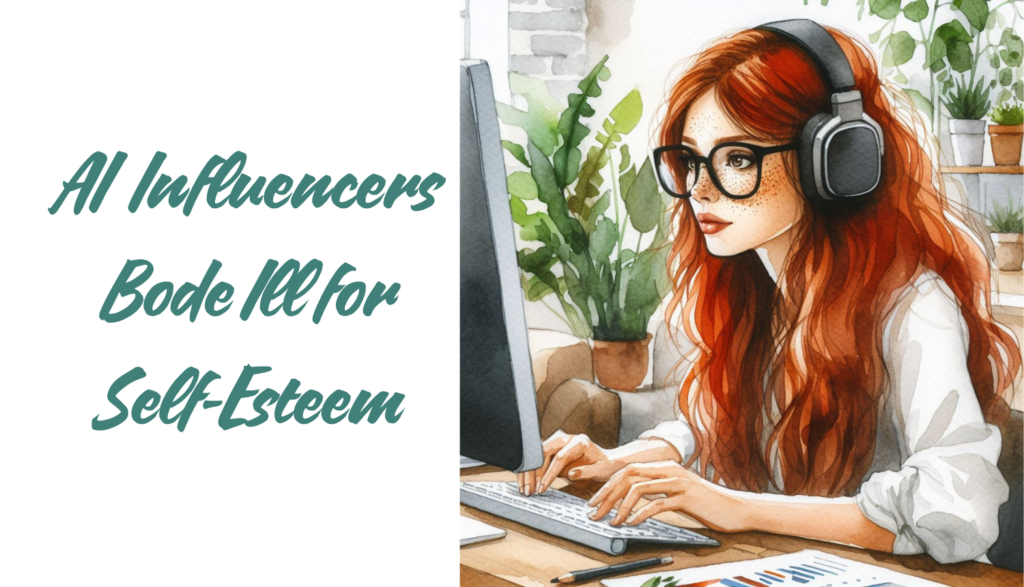There’s been a lot of reporting on AI this past year. Actors and writers went on strike to protest the use of AI in Hollywood. Creators sued AI companies over copyright issues and the use of their art in teaching AI models. And not-so-shockingly, AI generators were used to create explicit deepfakes of a certain chart-topping popstar.
But now we’re experiencing an influx of AI-generated “influencers.” And in an age where children are already flooded with images of real people that have been airbrushed to perfection and filtered to the point of nonsense, “AI hotties” bode ill for our collective self-esteem.
AI has a “hotness” problem, says Caroline Mimbs Nyce writing for The Atlantic. During Nyce’s own experiments with AI, she found that when generating images of people, “most were above-average hot, if not drop-dead gorgeous. None was downright ugly.” And if you take a look at the AI-generated images below, you’ll see what she means.
I went ahead and tested Nyce’s “hotness” theory using a very basic physical description of myself. I asked Microsoft Bing’s CoPilot (which is powered by Open AI’s DALL-E 3) to create an image of “a redhead woman with freckles typing at her desk.”

Nyce’s claims couldn’t have been more accurate. Each of the four images generated featured a “drop-dead gorgeous” woman with model-esque physique.
For years, magazines and advertisements have been criticized for setting unrealistic beauty standards. “[But] it’s acknowledged [those standards] are idealized,” says Rae Jacobson, writing for the Child Mind Institute “The models wearing Size 0 clothing are just that: models. And even they are made-up, retouched, and photoshopped.”
Social media took that trend to the next level, elevating normal, average-looking folks to “perfection” through photo-editing apps and filters. Worse still, says Jill Emanuele, Senior Director of the Mood Disorders Center at the Child Mind Institute, social media feeds “can become fuel for negative feelings [that teens] have about themselves. Kids struggling with self-doubt read into their friends’ images what they feel they are lacking.” But once again, at least we can remind our kids that what folks post on social media usually only represents a tiny snippet of a very carefully curated portion of their real lives.
However, when it comes to AI influencers, there’s no human aspect to sympathize or to help us realize that sometimes we use those meticulously crafted social media posts as a smokescreen to mask what we’re really feeling.
An AI-generated image will never speak out against having its image retouched or lead the charge against eating disorders, as many models have. And that artificially synthesized image can’t tell you that five seconds after it took that oh-so-wonderful beach vacation photo, a seagull pooped on its head.
If it did, it wouldn’t help, because we know that the AI isn’t real. It can’t experience body dysmorphia because it doesn’t have a body. It can’t sympathize with feeling lonely because it doesn’t have emotions.
So when AI-generated influencers, such as Aitana or Kuki, show up onscreen, how do we keep our kids (or ourselves) from comparing their lives and physical appearances to the AI’s?
- Cut back on social media in general. A study published in the Indian Journal of Psychiatry found that there is a negative correlation between self-esteem and social media addiction in adolescents. So limiting the amount of time your kids spend on social media seeing those AI influencers may be helpful in building a healthy self-image.
- Only follow real influencers who promote body positivity. Another study from the International Journal of Environmental Research and Public Health found it effective when celebrities and influencers were transparent with their posting practices and supported public health interventions to promote a positive body image. These types of campaigns foster self-esteem and create an emotional support group online that could help your vulnerable teen process how those images make them feel.
- Don’t focus on external beauty ideals. As a parent, you are actually the first line of defense against your children developing a negative self-image—both through your personal example and through affirmations of your kids. Demonstrate healthy social media habits to encourage your kids to do the same. And certainly try to avoid comparing yourself to these new AI influencers. But more importantly, remind your children (and yourself) that we are “fearfully and wonderfully made” (Psalm 139:14).
- Remember the facts. In a 2018 interview with Gigi Hadid, Blake Lively (wife of Ryan Reynolds) said, “It’s so important for young people not to compare themselves with what they see online. It’s our job as actors and/or models to be in shape. We have access to gyms and trainers and healthy food. And then on top of that, 99.9% of the time the images are Photoshopped.” YPulse found that nearly half of people ages 13-39 (45% of young females, 41% of young males) always edit their photos before posting online. Well, 100% of the time, AI influencers are edited, too, just by the nature of how their images are created.
I think the biggest takeaway here—for us and for the children in our care—is that “perfection” should never be the goal. We are all imperfect people created by a perfect God. He made us in His image, which is a beautiful and wonderful gift, especially since He has never focused on our external beauty. Instead, we should turn our eyes to inner beauty, and the fruit of the Spirit: love, joy, peace, patience, kindness, goodness, faithfulness, gentleness and self-control (Galatians 5:22-23).








3 Responses
Yet another good article.
This is a very good article. It reminds me of the ones Brio had when I was a teenager and I feel that helped keep me grounded regarding self-image issues.
One thing that is interesting is that the AI made 3/4 of the typing girls have their hands in the exact same position, which suggests that it is copying off a small sample of images of typists.
I remember watching a video about A.I and the future and it claimed that in the future, we will be looking up to A.I for inspiration, not humans. This scares me as a seventeen year old boy who wants to have kids so I can turn them into something like artist, musicians and composers.